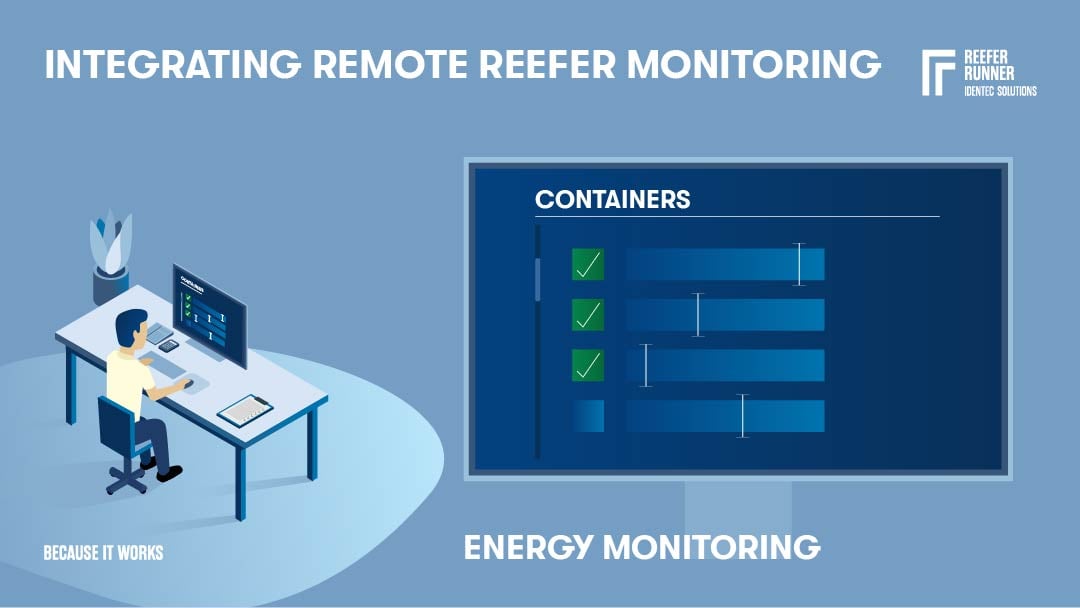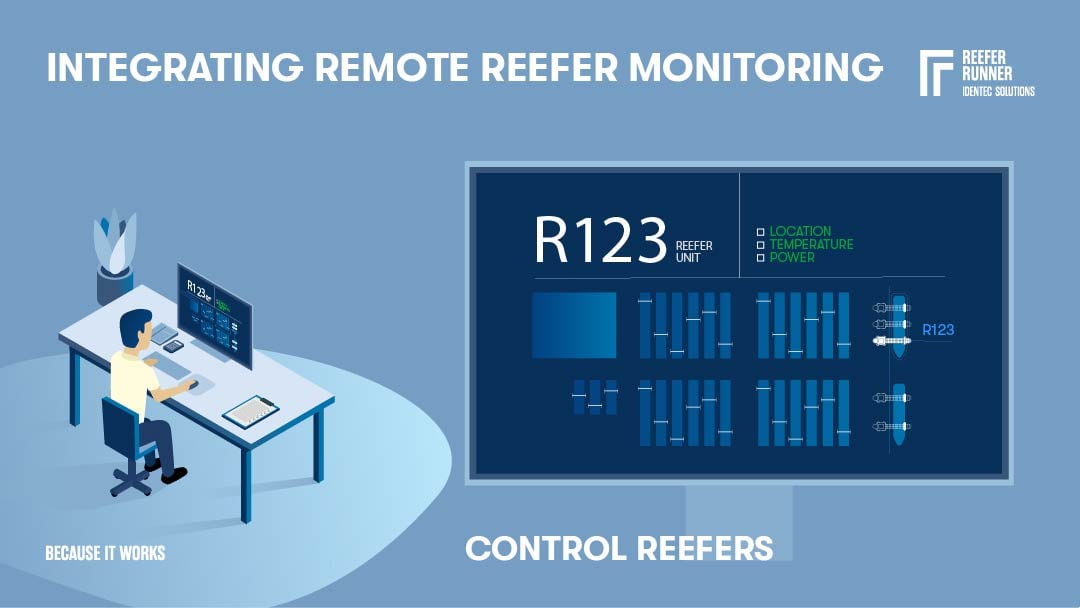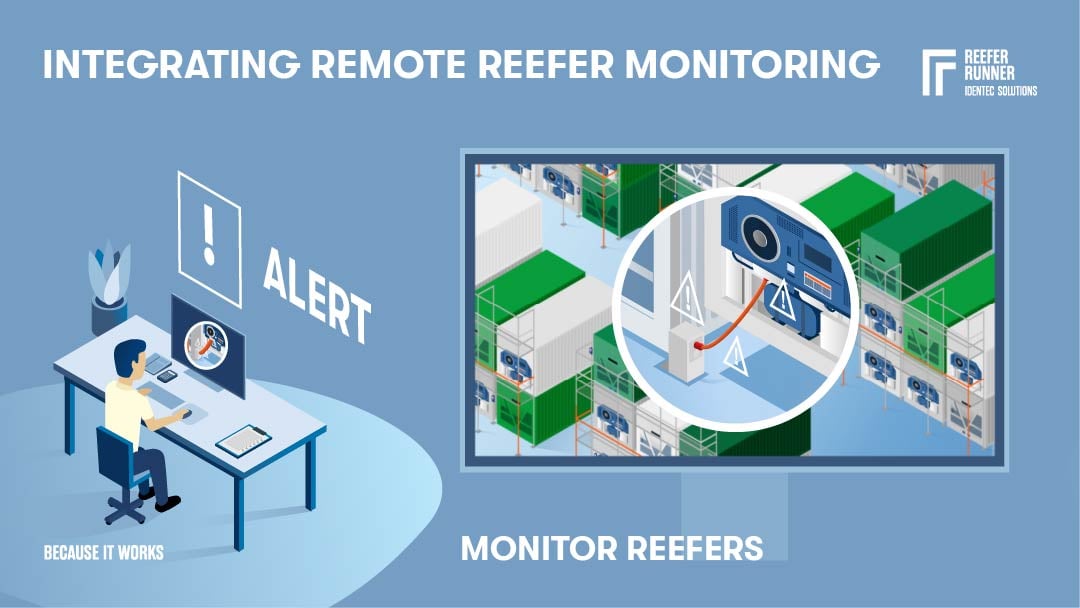Remote reefer monitoring system: How to integrate it?
| Written by Mark Buzinkay
A remote reefer monitoring and management system offers a number of benefits for container terminals. With its process-centric approach, the system is designed to handle the specific requirements of refrigerated containers. This includes integrating into the IT landscape of the terminal and becoming an integral part of its operations.

No video selected
Select a video type in the sidebar.
Table of contents:
- How Fewer Moves Create a Sustainable Port
- What Are the Benefits of Remote Reefer Monitoring and Management?
- Features of a Remote Reefer Solution
- How Do You Integrate Remote Reefer Management in the Terminal Operating System?
- Takeaway
- Glossary
Reefer operations in a container terminal
Reefer operations in a container terminal involve the movement and storage of refrigerated containers, also known as reefers. Reefers are specialised containers used to transport temperature-sensitive goods such as food, pharmaceuticals, and chemicals. Due to the nature of their contents, reefers must be carefully monitored and managed to ensure that the goods remain adequately cooled. The global cold chain market size is expected to reach USD 1,240.29 billion by 2033. (1)
A remote reefer monitoring and management system is designed to cover all aspects of refrigerated container management within a container terminal. With its process-centric approach, this state-of-the-art system handles the specific requirements of refrigerated containers. Built to integrate into your terminal's IT landscape, it will become an integral part of your operations.
The solution consists of hardware that wirelessly communicates data to a server when connected to the refrigerated container. The server processes and distributes the information to client applications and the Terminal Operating System (TOS). This allows for real-time monitoring of the reefers and provides a historical record of their activities (learn more about reefer monitoring integration with Navis N4).
A remote reefer management system (like Reefer Runner) provides a complete solution for managing reefers in a container terminal. Integrating into the terminal's existing IT infrastructure provides an efficient and effective way to monitor and manage these specialised containers.

What are The benefits of remote reefer monitoring and management?
A Remote Reefer Monitoring and Management solution offers many benefits to users, including the ability to remotely monitor and control refrigerated containers, mitigate load-loss or spoilage, identify and react to cargo impact events, significantly reduce or eliminate manual inspections, detect operational weak spots, allocate accountability, and adjust management accordingly.
Additionally, the system can automate and optimise reefer maintenance and service operations for more seamless operations, maximise asset life cycle, react in real-time to minimise or preempt equipment issues for more seamless operations, and reduce M&R costs and equipment management. These benefits work together to create a more efficient and effective way of managing refrigerated containers, ensuring that cargo remains safe and secure while in transit.
When you have a best-of-class remote reefer monitoring and management system in place, terminals can enjoy a number of technical benefits that make cool container management even more efficient and effective. For starters, the system wirelessly communicates data from the refrigerated containers to a server, which then processes and distributes the information to client applications and the Terminal Operating System. This eliminates the need for manual data entry, which can be time-consuming and prone to error. Additionally, the system provides real-time visibility into the status of all refrigerated containers within the terminal, allowing for proactive decision-making in the event of an issue. Finally, integrating the system into the terminal's IT landscape allows for seamless communication and coordination between all stakeholders involved in cool container management. As a result, the remote reefer monitoring and management system provides a comprehensive solution for optimal cool container management within container terminals.
If you are interested in reefer monitoring on vessels, then read our story about the Polarstern, a research icebreaker in Antarctica.

Features of a remote reefer solution
Remote reefer monitoring and management systems allow users to monitor and control the set-point temperature, humidity levels, and O2 and CO2 levels in a refrigerated container. The system can also be used to monitor the temperature in real time, as well as to run pre-trip diagnostics remotely. Additionally, the system can be used to change temperature settings from a phone or desktop, calibrate sensors and run defrost cycles, and access and print data logs and histories. Shock and damage alerts are another feature of many remote reefer monitoring and management systems, as is the ability to remotely upload data log files, monitor plug-in times, and monitor usage and run times. Some systems also allow for remote software upgrades. Installation of a remote reefer monitoring and management system is typically fast and simple, using an iOS or Android smartphone app.
The data collected by a remote reefer monitoring and management system can be used to manage refrigerated containers in a number of ways. For example, the data can be used to track the status of a container throughout its journey from origin to destination. Additionally, the data can identify patterns and trends in container use, which can help improve efficiency and optimise operations. The data can also be used to diagnose problems with a container, such as if the temperature is not being maintained at the set point or if there is a leak in the seals. By using the data collected by a remote reefer monitoring and management system, it is possible to improve the safety and efficiency of refrigerated container operations.
If available, a remote reefer management system also features energy monitoring of reefer power consumption. This enables the terminal to track and record power consumption data, which can be used to improve efficiency. By constantly monitoring the power consumption of reefers, the system can identify potential issues early on and take corrective action to prevent problems from occurring. This helps keep containers operating at peak efficiency, saving time and money.
In addition, the energy monitoring feature can also be used to analyse trends over time. This information can be used to make long-term decisions about things like infrastructure upgrades and changes in operational procedures. By understanding how power consumption patterns change over time, the terminal can make more informed decisions that will help to improve overall efficiency and reduce costs.

How do you Integrate remote reefer management in the terminal operating system?
Remote reefer management must be easily integrated into an existing container terminal landscape of TOS, reefers and port infrastructure. A good example is Reefer Runner, which integrates directly with the market-leading Navis N4 container TOS and works right out of the box without additional modifications. Reefer Runner also interoperates with other TOS like Tideworks, RBS, Cyberlogitec, and others.
A remote reefer management system also should easily scale to monitor every reefer container in the terminal, sometimes thousands of reefer points. It provides data that can be accessed at any time from any location. Combined with a TOS, you gain limitless possibilities to enhance your operational efficiency.
The remote reefer management server connects with the TOS over an API based on the HTTPS protocol. Also, the server requires databases, an OS and memory space of several GB. Finally, communication between the individual tags and the remote reefer control (RMC) happens over WiFi or Ethernet interface.
Reefer Runner is the perfect solution for terminals looking to improve their reefer container management processes. By integrating Reefer Runner into their existing TOS, terminals can optimise their operations and improve efficiency.
One essential aspect of integrating remote reefer monitoring and management system into your container terminal operations is looking for a turnkey solution provider. Ensure your project is executed by an experienced Project Management team in terminal implementations without hidden costs. A thorough site investigation should be part of the offer, and training should be provided for all reefer staff, such as technicians, administrators, and managers. Hardware, software and the TOS interface should be documented and commissioned by your solution provider).
Takeaway
The remote reefer management system is a comprehensive solution for managing refrigerated containers within container terminals. With its process-centric approach, the system handles the specific requirements of refrigerated containers. Integration into your existing IT landscape should be a plug&play process at best, based on a proper project plan from an experienced solution partner.
If you want to learn more about Reefer Runner, the world leading remote reefer monitoring and management system, contact us, and we can help you to answer your questions. Reefer Runner is easy to use and provides a wealth of features and benefits that make it an invaluable part of any container terminal's operations.
Delve deeper into one of our core topics: Reefer monitoring
Glossary
API (Application Programming Interface) is a set of protocols, tools, and definitions that enable different software systems to communicate and share data seamlessly. In logistics, APIs facilitate the exchange of information between various platforms, such as warehouse management systems and transportation management systems. They streamline processes like order tracking, inventory updates, and shipment management, enhancing efficiency and reducing errors in supply chain operations. (4)
Pre-trip diagnostics (PTI) for reefer containers involve a thorough inspection and testing of the refrigeration unit before it is loaded and shipped. This process ensures the reefer is functioning correctly, including temperature control, cooling efficiency, electrical systems, and alarms. PTI helps prevent malfunctions during transit, safeguarding perishable cargo and maintaining cold chain integrity. It is a standard procedure in reefer container operations to ensure reliability and minimise risks. (5)
References:
(1) P. Tang, O. A. Postolache, Y. Hao and M. Zhong, "Reefer Container Monitoring System," 2019 11th International Symposium on Advanced Topics in Electrical Engineering (ATEE), Bucharest, Romania, 2019, pp. 1-6, doi: 10.1109/ATEE.2019.8724950.
(2) Choi, S.-P. et al. (2015) “Development of Reefer Container Real-time Management System,” Journal of the Korea Institute of Information and Communication Engineering. Korea Institute of Information and Communication Engineering (Nurimedia). doi: 10.6109/jkiice.2015.19.12.2917.
(3) https://straitsresearch.com/report/cold-chain-market
(4) Mark Rowbotham (2014): Introduction to Marine Cargo Management. Routledge.
(5) Manfred Bortenschlager, Steven Willmott, and Matthias Biehl (2020): The API Economy: Disruption and the Business of APIs. Independently Published.
Note: This article was updated on the 12th of September 2025.

Author
Mark Buzinkay, Head of Marketing
Mark Buzinkay holds a PhD in Virtual Anthropology, a Master in Business Administration (Telecommunications Mgmt), a Master of Science in Information Management and a Master of Arts in History, Sociology and Philosophy. Mark spent most of his professional career developing and creating business ideas - from a marketing, organisational and process point of view. He is fascinated by the digital transformation of industries, especially manufacturing and logistics. Mark writes mainly about Industry 4.0, maritime logistics, process and change management, innovations onshore and offshore, and the digital transformation in general.
Related Articles
Related Product


